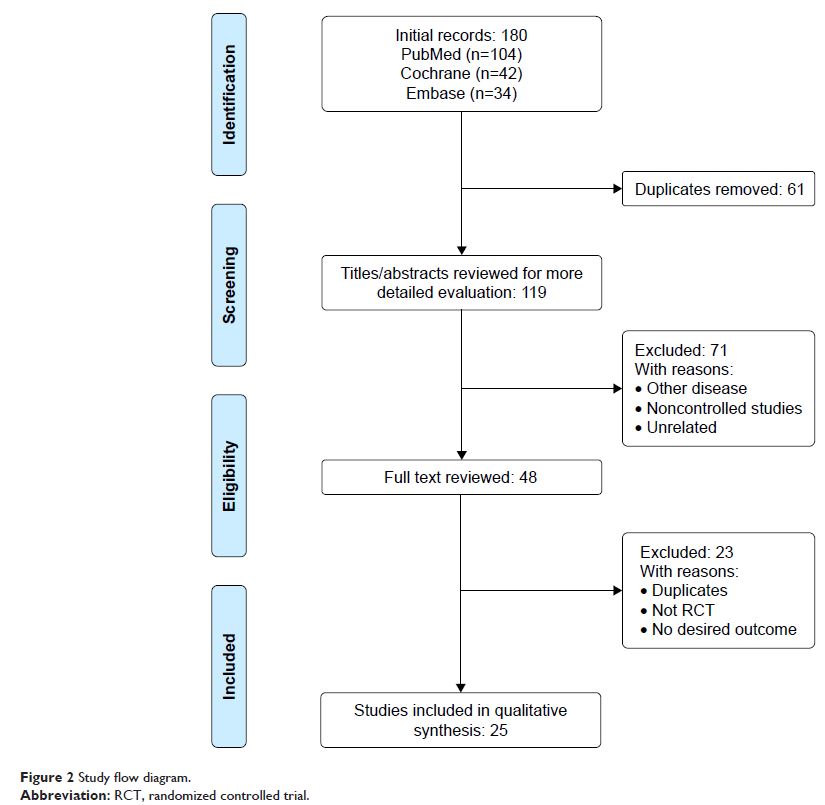108605
论文已发表
注册即可获取德孚的最新动态
IF 收录期刊
- 3.4 Breast Cancer (Dove Med Press)
- 3.2 Clin Epidemiol
- 2.6 Cancer Manag Res
- 2.9 Infect Drug Resist
- 3.7 Clin Interv Aging
- 5.1 Drug Des Dev Ther
- 3.1 Int J Chronic Obstr
- 6.6 Int J Nanomed
- 2.6 Int J Women's Health
- 2.9 Neuropsych Dis Treat
- 2.8 OncoTargets Ther
- 2.0 Patient Prefer Adher
- 2.2 Ther Clin Risk Manag
- 2.5 J Pain Res
- 3.0 Diabet Metab Synd Ob
- 3.2 Psychol Res Behav Ma
- 3.4 Nat Sci Sleep
- 1.8 Pharmgenomics Pers Med
- 2.0 Risk Manag Healthc Policy
- 4.1 J Inflamm Res
- 2.0 Int J Gen Med
- 3.4 J Hepatocell Carcinoma
- 3.0 J Asthma Allergy
- 2.2 Clin Cosmet Investig Dermatol
- 2.4 J Multidiscip Healthc

通过荟萃分析和系统评价来评估促红细胞生成素在全髋关节和膝关节置换术中的应用
Authors Li Y, Yin P, Lv H, Meng Y, Zhang L, Tang P
Received 7 December 2017
Accepted for publication 13 April 2018
Published 10 July 2018 Volume 2018:14 Pages 1191—1204
DOI https://doi.org/10.2147/TCRM.S159134
Checked for plagiarism Yes
Review by Single-blind
Peer reviewers approved by Dr Hoa Le
Peer reviewer comments 3
Editor who approved publication: Professor Deyun Wang
Purpose: The debate is still ongoing on the effectiveness and safety of
erythropoietin (EPO) treatment in orthopedic surgeries. Specifically, previous
studies have not compared the dynamic change of hemoglobin (Hb) levels between
different transfusion methods. Besides, complications or side effects of this
alternative have not been quantitatively analyzed. We conducted a meta-analysis
and systemic review to evaluate the efficacy of EPO on Hb levels observed
during the whole perioperative period as well as the volume of allogeneic blood
transfusion (ABT), the risk of venous thromboembolism, and application
frequency of ABT in hip and knee surgery.
Materials and methods: PubMed, Embase, Web of Science, and the Cochrane
library were systematically searched from inception to November 2017. The data
from randomized controlled trials were extracted and the risk of bias assessed
using Cochrane’s Collaboration’s tool.
Results: Twenty-five randomized controlled trials
involving 4,159 patients were included in this meta-analysis. EPO could reduce
exposure to allogeneic blood transfused (odds ratio [OR] =0.42, P =0.001) and reduce the average
volume of allogeneic blood transfused (OR = -0.28, P =0.002). When EPO and
preoperative autologous blood donation (PABD) were compared, the use of EPO was
associated with lower exposure to ABT (OR =0.48, P =0.03), but no significant
decrease in the average volume of allogeneic blood transfused (OR =
-0.23, P =0.32). The use of EPO was
associated with a higher level of Hb with or without use of PABD at all the 4
time points (preoperation, 24–48 hours postoperation, 3–5 days postoperation,
discharge of last observation) (P <0.0001), which
means EPO could increase the level of Hb significantly during the perioperative
period. The results also indicated EPO does not increase the risk of a venous
thromboembolism event.
Conclusion: Preoperative administration of EPO was shown to
generally increase Hb levels during the whole perioperative period; however,
the extent of the positive effects varies with time points. Additionally, EPO
minimizes the need for transfusion significantly in patients undergoing hip or
knee surgery without increasing the chance of developing thrombotic
complications. Therefore, EPO offers an alternative blood management strategy
in total hip arthroplasty and total knee arthroplasty.
Keywords: erythropoietin,
allogeneic transfusion, hemoglobin, autologous blood donation, total hip
arthroplasty, total knee arthroplasty
